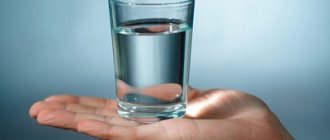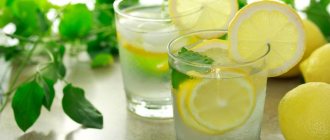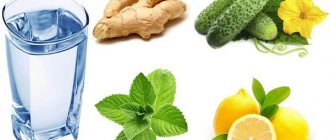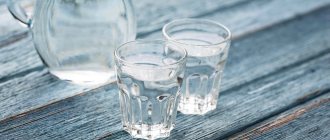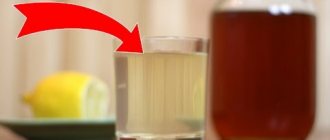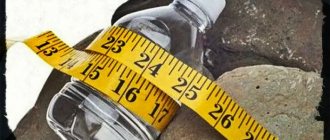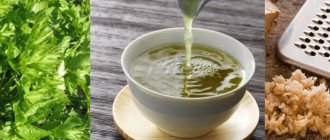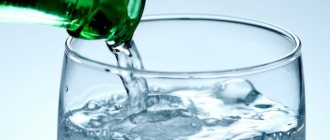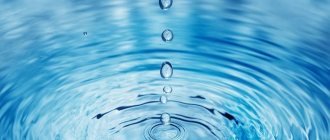People who are overweight over time come to the conclusion that they need to take care of their body. This happens at different periods of life and for various reasons. It is well known that water, which is 0 kcal, becomes part of a balanced diet when a person begins to lose weight. At best, our body receives a liter of water every day along with food. For our body, taking into account its needs, this is very little, as a result of which it begins to retain fluid in the cells. A person’s body volume begins to imperceptibly increase, it becomes shapeless. Very often, we perceive signals of thirst as a signal of hunger. We begin to satisfy hunger, instead of thirst, and this is how metabolism deteriorates - we simply misunderstand the signals of our body.
If a person decides to lose excess weight, he should increase the amount of purified water he drinks per day to about two liters. You should always remember that due to a lack of regular purified water in the body, the process of weight loss slows down. Our liver needs water to process fat deposits. Please note that it is better to gradually increase the amount of water per day to the norm. If you drink the required amount of fluid with 0 kcal and do not perform regular physical activity, the process of losing weight will be extremely slow.
How many calories are in sparkling water?
Carbonated water without any additives has no calories. It’s good to make lemonade from soda, adding lemon and orange juice to it, sweetening it a little with sugar. This drink, if cooled, will perfectly quench your thirst in hot weather, but you should not drink it in large quantities and expect weight loss. The calorie content of such a drink will be calculated by the amount of added fruit, which means it will no longer be zero.
Reduces consumption of high-calorie drinks
Our body receives calories not only from solid, but also from liquid food. High-calorie drinks include sugary soda, sweetened juices, and tea and coffee with sugar. They can also contribute to excess weight gain and hinder weight loss.
If you drink large amounts of water, then you no longer need to drink high-calorie drinks. This will help you get rid of excess weight. Research by scientists has shown that if you drink water instead of high-calorie drinks for six months, your weight can decrease by 2-2.5%.
Calories in coconut water
Coconut water is the young liquid endosperm of the coconut palm fruit. This substance is formed from flowering palm trees, the life cycle of which involves fertilization. The endosperm itself is saturated with carbohydrates, proteins and even fats in a form that is easily digestible. Coconut water has a calorie content of no more than 20 calories per 100 grams and has excellent substances.
This water contains:
- B vitamins that have a beneficial effect on the human nervous system.
- Eight essential amino acids for humans.
- Calcium, magnesium, iron, phosphorus.
As long as the coconut is not damaged, the water in it remains sterile and retains its beneficial properties to the maximum.
What kind of water is healthy and should you drink?
Liquids include fresh water and all other drinks such as milk, coffee, tea, soup, juice and even alcoholic beverages.
Fresh water is the best drink because it contains no kilojoules and provides the best hydration to the body.
Milk (especially low-fat milk) is an important liquid, especially for children, and contains about 90 percent water.
Tea can be an important source of fluid. Tea can help you meet your daily fluid recommendations and is a source of antioxidants and polyphenols that protect against heart disease and cancer.
Fresh fruit is preferred over fruit juice because it contains more fiber and nutrients and less sugar.
Avoid sweet and artificially sweetened drinks
Dietitians recommend limiting the consumption of drinks containing sugar, including sweetened teas, fruit drinks, vitamin waters, flavored mineral waters, energy drinks and sports drinks.
Consuming sugary drinks provides extra calories but not other essential nutrients. There is strong evidence of a link between the consumption of sugary drinks and excess weight gain in children and adults, as well as decreased bone strength and tooth decay.
Does cold water burn calories?
Water itself, as we have already said, does not contain calories, but if you provoke the body to heat the cold liquid consumed to body temperature? How many calories does drinking cold water burn? Studies have shown that the body, heating 500 ml of ice water, will spend only seventeen kcal. Let us remember that the daily rate of energy consumption is up to 600 kcal and we are convinced that drinking cold water is absolutely inadvisable. At the same time, the possibility of catching a cold increases several times. As you understand, drinking ice water to lose weight is not recommended.
How does temperature affect
Water temperature has a direct impact on losing extra pounds. The pools are mostly heated, so the water temperature reaches up to 29 degrees. This is very comfortable, but not as effective for weight loss as we would like. After all, such comfortable water will not require any extra expenditure of energy; it will relax and unwind. Therefore, it is worth remembering that the effectiveness of weight loss exercises is achieved at 26-27 degrees. Unplanned expenditure of energy to maintain temperature forces the body to waste fat resources, and it simply “melts”.
How to lose weight with water?
In order for water to promote weight loss, you need to know how best to consume it. We have already written in the article that for normal functioning you need to drink at least one and a half liters of water a day. But what to do if a person is not used to drinking this amount of liquid per day? The fact is that you need to take water like medicine. After all, when a person is prescribed medicine, he drinks it, regardless of whether he took it before or not. It is important to understand the enormous benefits this low-calorie liquid brings.
Recommendations for drinking water are:
- Try to start your day with a glass of purified water on an empty stomach. Let the water be no lower than room temperature, which promotes a soft “start” of all body processes.
- Throughout the day, try to carry a bottle of water with you and take a sip whenever you remember it. Don't think that thirst will come. Just take a sip whenever you remember. When a person slowly increases the dose of water he drinks per day, it has a good effect on the body.
- If the body does not have enough fluid, it will begin to retain water in each of its cells. From here we can observe an increase in volume in all parts of the body.
We believe you have noticed that if a person begins to eat properly and drink more water, then first of all his body volume decreases. Accordingly, the best results in losing weight will be visible within the first month. It is due to the fact that the body stops retaining fluid in the cells that a person noticeably loses weight.
It’s difficult to start drinking water, what should you do?
Take a few sips. Today take a couple of sips on an empty stomach, the next day add a couple more sips. This way you will quietly increase the amount of water you drink to the prescribed two hundred milliliters on an empty stomach.
Other benefits of drinking water
— Water helps prevent non-communicable diseases.
— Water helps reduce toxicity in the body.
Drinking enough water helps reduce stress.
— Water improves brain function and helps improve mood.
-Water helps improve skin health.
-Helps digestion.
- Helps absorb nutrients.
—Water helps improve bowel movements along with dietary fiber.
- Promotes the formation of saliva.
– Protects tissues, spinal cord and joints.
– Helps remove waste from sweating, urination and bowel movements.
- Helps maximize physical performance.
— Improves oxygen circulation in the blood.
- Prevents general dehydration.
- Helps prevent and treat headaches.
- May help treat kidney stones.
- It may help regulate blood pressure and improve cardiovascular health.
- Reduces cholesterol levels.
BZHU and KBZHU water per 100 grams
Water is an inorganic substance that is the basis of all processes occurring in living organisms.
It contains no proteins, fats or carbohydrates; as a result, the KBJU of water is rated as zero.
The processes of nutrition, digestion, respiration, thermoregulation, growth, childbirth, metabolic processes - everything is based on water.
Being a universal solvent, natural water includes various chemical elements and compounds that are not always safe for humans.
According to hygienic quality requirements (regulated by SanPin), drinking water cannot contain the following impurities:
- harmful substances;
- pathogenic microorganisms;
- radioactive substances;
- causing the presence of foreign odors and tastes.
Drinking water is a clear, colorless liquid; these indicators are controlled by the criteria of color and turbidity.
Its chemical composition is characterized by:
- acidity, pH = 7, neutral environment;
- hardness - an indicator of the amount of dissolved salts;
- total mineralization – total amount of dry residue, mg/l.
The best among bottled products are “BonAqua”, “Aqua Minerale”, “Holy Source”, “Kubai”, etc.
We recommend that you familiarize yourself with the BJU of yolk
Interesting! Chemically pure water - distilled - does not quench thirst. Completely devoid of taste, it is perceived by the body as something wet and unpleasant.
BJU and calorie content of water
| Proteins, % | 0,00 |
| Fats, % | 0,00 |
| Carbohydrates, % | 0,00 |
| Calorie content, kcal | 0,00 |
Coconut water
Inside the unripe fruit of the coconut palm there is a colorless, slightly cloudy liquid called coconut water. In tropical countries, it is a popular tonic drink; it is drunk fresh, by punching a hole in an unripe coconut, and sold in bottles and cans.
The composition of the drink consists of 95% water and is rich in microelements and vitamins.
BJU and calorie content of coconut water
| Proteins, % | 0,72 |
| Fats, % | 0,21 |
| Carbohydrates, % | 3,72 |
| Calorie content, kcal | 19,00 |
Interesting! Coconut water is only found in the unripe fruit. As it matures, the liquid gradually thickens to a solid state.
Mineral water
Complex solutions, including colloidal particles dissociated into ions, undissociated molecules and biologically active substances, are called mineral waters.
Natural mineral waters are divided into drinking and for external use. Both types are used for therapeutic procedures in balneotherapy.
Drinking mineral waters are classified:
- dining rooms – slight mineralization, the product can be used by healthy people without restrictions;
- medicinal table - average level of mineralization, can be used by healthy people in limited quantities and irregularly;
- medicinal - highly mineralized, with a high concentration of biologically active substances, used only for medicinal purposes, contraindicated for healthy people.
We recommend that you familiarize yourself with the BJU of raspberries
As an external remedy, mineral waters are used for inhalation, rinsing, irrigation, baths, showers, etc.
BJU and calorie content of mineral water
| Proteins, % | 0,00 |
| Fats, % | 0,00 |
| Carbohydrates, % | 0,00 |
| Calorie content, kcal | 0,00 |
Lemon water
Lemon water is used as a vitamin pump for the body. The drink can be prepared in two ways by adding to 1 liter of warm boiled water:
- juice of one lemon and mix;
- one lemon, ground with peel, let it brew for 4 hours, strain.
This lemonade is an excellent means of preventing colds and strengthening the immune system. Water with lemon improves digestion, speeds up metabolic processes, and is an effective natural tonic.
Lemon water BZHU
| Proteins, % | 0,00 |
| Fats, % | 0,00 |
| Carbohydrates, % | 4,47 |
| Calorie content, kcal | 15,00 |
Important! Lemon water is contraindicated for people with high acidity and gastrointestinal problems.
Sparkling water
When drinking or mineral water is saturated with carbon dioxide, a refreshing drink is obtained that quenches thirst.
Carbon dioxide, which is used for carbonation, does not dissolve in water, therefore, does not change its properties.
The KBZHU values for sparkling water are the same as for drinking or mineral water – zero.
We recommend that you familiarize yourself with the BZHU of lavash
Water with honey
Honey water has been known in folk medicine for a long time. The drink is used as a prophylactic agent that activates the immune system, increases stress resistance, and stimulates brain activity.
Important! To prepare a full-fledged honey drink, add honey to warm water, preferably unboiled water.
Regular use of water with honey normalizes the functioning of the gastrointestinal tract, liver, gall bladder, and alleviates diseases of the respiratory system. It restores normal intestinal motility, solving the problem of constipation.
Honey drink has a pronounced antiparasitic and antiviral effect.
The drink has contraindications:
- allergy to bee products;
- diabetes;
- increased acidity;
- pregnancy and lactation period.
BJU and calorie content of honey water (1 teaspoon of honey per 200 ml of water)
| Proteins, % | 0,04 |
| Fats, % | 0,00 |
| Carbohydrates, % | 3,96 |
| Calorie content, kcal | 15,45 |
Interesting! If lemon juice is added to honey water, the resulting drink will help cleanse the body.
Other types of liquid
Today in any store you can find a huge variety of drinks:
- based on spring water;
- carbonated;
The presence of gas and where the liquid is taken from does not increase its energy value. How many calories are in mineral water? The quantity is the same as in the usual one, equal to zero. But other supplements can increase this figure. For example, if you squeeze half a lemon into a glass, it will already contain calories. Not very much, but these numbers are important for those who are calculating the value of their diet. So, 100 g of lemon juice contains 16 kcal. Therefore, a teaspoon contains very few calories, but if you add sugar or syrup, the drink will “weigh” much more.
It is not for nothing that those losing weight are contraindicated from drinking sweet soda - it contains a lot of so-called “empty” calories, which are not spent by the body, but go straight into body fat. Therefore, everyone who is forced to monitor their weight should forget about lemonade, cola, ready-made bottled tea - there are also many additives that do not benefit health (flavors, dyes, etc.).
Another common drink is tea. Without additives, it contains so few calories that they can be ignored. But each teaspoon contains 5 g of sugar - that’s 20 calories, if “heaped”, then 8 kcal more. Many people do not limit themselves to one spoon, they add 3-4, drinking several glasses of tea a day. And this already turns out to be a noticeable amount, comparable to a snack. If you add milk or syrup, the energy value will increase.
When stopping to grab a bite to eat at a cafe, you should also be careful about the choice of drinks. For example, a small portion of latte contains about 150 Kcal, and a large one - almost 300. If you eat this with a piece of cake (a standard piece of 150 grams is 350-400 Kcal), you will get half the daily requirement (with a sedentary lifestyle it is 1200 Kcal). Therefore, while burning excess fat, you should forget about gatherings in your favorite cafes. Or limit yourself to just a drink, without filling it with sweets, and be sure to include your snack in your food diary.
